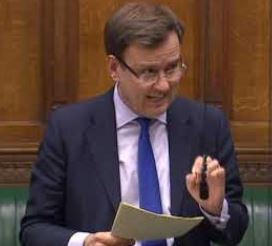'This Agreement is One of the Worst Possible Combinations'
Chelsea and Fulham MP Greg Hands explains why he voted against Brexit deal
Chelsea and Fulham MP Greg Hands has voted against the Withdrawal Agreement proposed by Theresa May.
Ahead of the vote, he gave the reasons for his decision in a speech to the House of Commons during the Brexit debate on Monday.

He said: " I am not an ideologue on Brexit; I campaigned hard to remain in 2016, and do not regret having led the 'Stronger In' campaign in my constituency. My strong family and other links to the continent mean that I have never been what is called a 'Brexiteer'. But like my right hon. Friend Sir Nicholas Soames and unlike my hon. Friend Dr Wollaston, I strongly believe that the referendum in 2016 was a legitimate exercise, with huge voter participation. It did not get the result that I wanted, but the result needs to be respected.
"
I have spent the last two and a half years believing that, with the right deal, Brexit could work. Indeed, the ability to leave the EU is in the treaties themselves.
"My view, however, is that as it currently stands, this agreement is one of the worst possible combinations. I am stating today for the first time that, as the deal currently stands, I will vote against it tomorrow night. Brexit is a set of challenges and opportunities, but this deal fails to address the challenges. It kicks the can down the road on EU trade until at least December 2020. It closes down the opportunities: most prominently, there is not going to be an independent trade policy of any consequence.
"Some say that there are merits. The Prime Minister lauds and promotes some of them. For example, the deal ends free movement but for me and my inner London constituents, free movement has never been a particular issue. Some 11,000 nationals of EU countries in Chelsea and Fulham are all very welcome to stay — one is even my wife. The Prime Minister’s achievement in ending free movement is not much of one at all for me and my constituency.
" The three principal reasons why I oppose the agreement are, first, that it treats Northern Ireland very differently from the rest of the UK; secondly, there is the backstop itself. Both those reasons have featured quite heavily.
"My third reason is this: I believe that embedded within the agreement is being in a customs union with the European Union for the long term, not just in the backstop. That is the stated goal in the future partnership. It is a myth that the withdrawal agreement plus the future partnership opens up all possible future trade outcomes. No: the economic partnership will
'build and improve on the single customs territory provided for in the Withdrawal Agreement which obviates the need for checks on rules of origin'.
" It 'builds and improves on' - that is unacceptable. There is not going to be any independent trade policy in a customs union or in any single customs territory. Indeed, Sabine Weyand, Michel Barnier’s No. 2, briefed EU ambassadors that the future partnership 'requires the customs union as the basis of the future relationship'.
"That gives rise to all kinds of problems: trade agreements, the Turkey trap, and the contracting out of trade remedies to Brussels, with the effect that will have on key UK industries such steel and ceramics. The UK will lose its say and contract out that policy to Brussels.
"Then there are trade preferences. How we treat the developing world is incredibly important. Those will now be a matter for Brussels. That will be a huge loss for UK influence in foreign policy.
"I talked earlier today about some of the comments made by some senior EU officials. I will not repeat those now, but it is always worth while for us to study what somebody we are negotiating with is saying. Most, maybe all, of the alternatives are preferable to the agreement as it currently stands.
"Brussels needs a deal too, and Barnier’s mandate is to achieve a deal. Unless the deal can pass the House of Commons, it is not a deal at all."
You can read more about Greg Hand and his views on Brexit here .
January 16, 2019
Related links
|